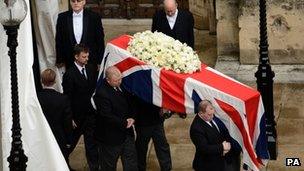Are we all Thatcherites now?
- Published

David Cameron's claim on BBC Radio 4 that "in a sense we are all Thatcherites now" is being seen by some as evidence that Margaret Thatcher's funeral is being used to make a party political point, writes BBC political editor Nick Robinson.
However, I think the prime minister was making a rather different point to the one some think he is making. Yes, he was asserting that Lady Thatcher had, like Labour's Clement Attlee before her, forged a new political consensus.
Where after the war Attlee established the case for the NHS, state education and a welfare state, Thatcher, after the industrial wars of the 70s and the Cold War, won the arguments for a market-based economy, the private ownership of key industries and services, limits on trade union power and a strong defence policy based on the Atlantic Alliance.
Whilst many will argue with many aspects of the Thatcher legacy - and some will, no doubt, protest about it today - that is an analysis which few will contest - though, of course, any consensus can be broken and re-made just as privatisation did to the previously widespread belief in the value of nationalisation.
By making this case David Cameron was, I believe, consigning Thatcherism to the past instead, as he could have done, claiming that he was its inheritor and that today's battles were an extension of hers.
It was in the same spirit, I think, that he emphasised that he was at school when Margaret Thatcher was elected instead of recalling his time working as a researcher for Prime Minister's Questions in her last years in Downing Street.
It was also not by chance that he acknowledged that she was a divisive figure and that his friend and ally Michael Gove wrote about the "need to heal and unite individuals as much as identify and defeat enemies".
Today's Conservative leadership have used this week to praise Lady Thatcher but also to bury the idea that all their party needs is a revival of her ideas and her style of leadership.